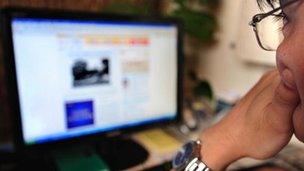Children in care data found on public PC in New Zealand
- Published

Confidential government files belonging to New Zealand's Ministry for Social Development have been freely accessible from computers available for the public to use.
Blogger Keith Ng says he was able to download 7,000 files from the department's network.
He used a public computer provided in Work and Income New Zealand (WINZ) offices for job hunters.
The files included the names of children currently in state care.
Some basic search functions had been disabled but the names of people suspected of benefit fraud and invoices from contractors were easily retrievable "by just using the open-file dialogue on Microsoft Office", wrote Mr Ng in a post for blogger community Public Address.
He was also able to see children's medical records, legal bills and debt collector invoices.
"I sorted through 3,500 invoices. This was about half of what I obtained, and what I obtained was about a quarter of what was accessible," he said on his blog.
Social Development Minister Paula Bennett told Radio New Zealand: "I apologise to everyone now.
"I'm mortified that they had that level of trust in the ministry and at some level we've let them down."
New Zealand's Assistant Privacy Commissioner Katrine Evans said the ministry had shut down all of the computer "kiosks" in its public offices and there was no evidence the network had been hacked.
"Protecting personal information is a cornerstone of public trust in both government and business, particularly in the digital environment - and this is one of several recent incidents that show that agencies need to up their game," she said in a statement.
Mr Ng has handed over all the files he downloaded and says he did not keep copies.
"This stuff was all a few clicks away at any WINZ kiosk, anywhere in the country. The privacy breach is massive, and the safety of vulnerable children was put at risk," he said.
"This should never have happened."
- Published10 October 2012
- Published12 October 2012